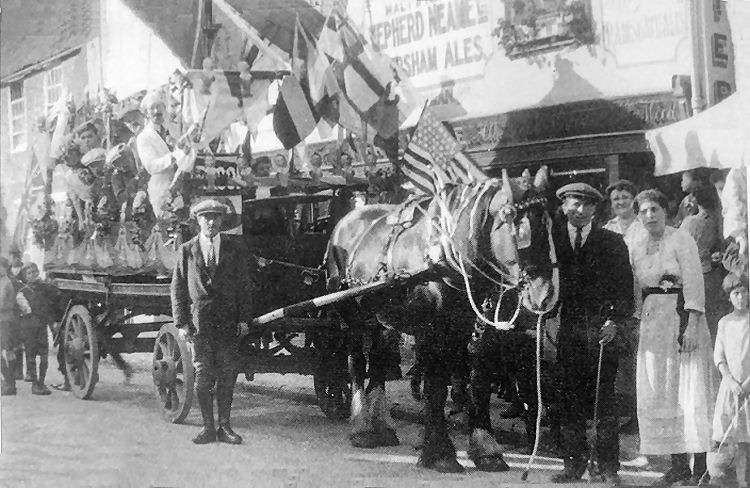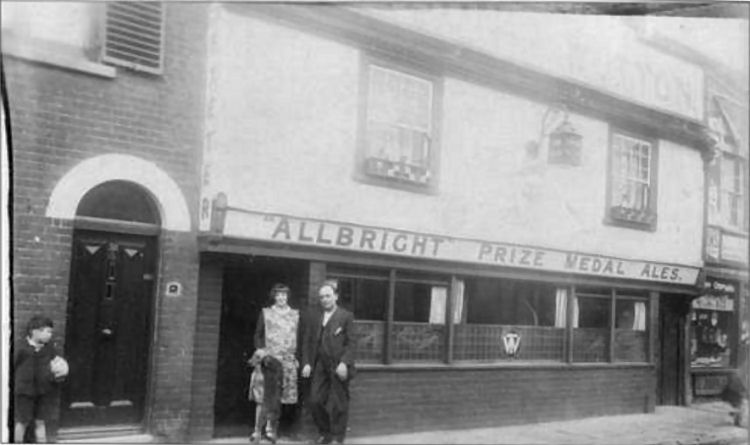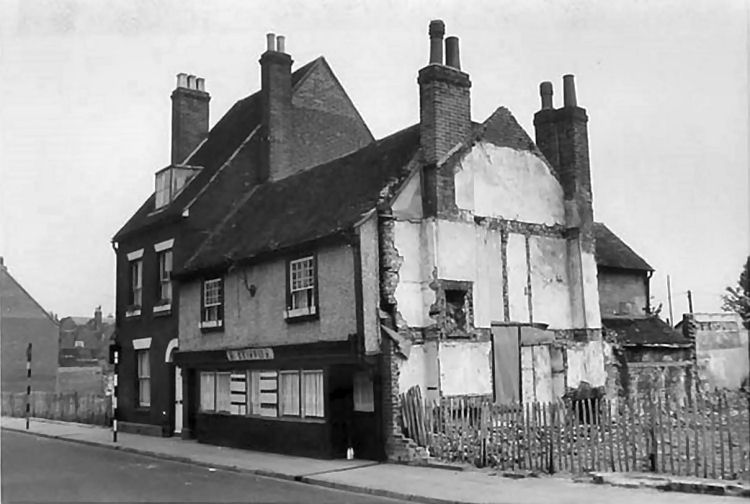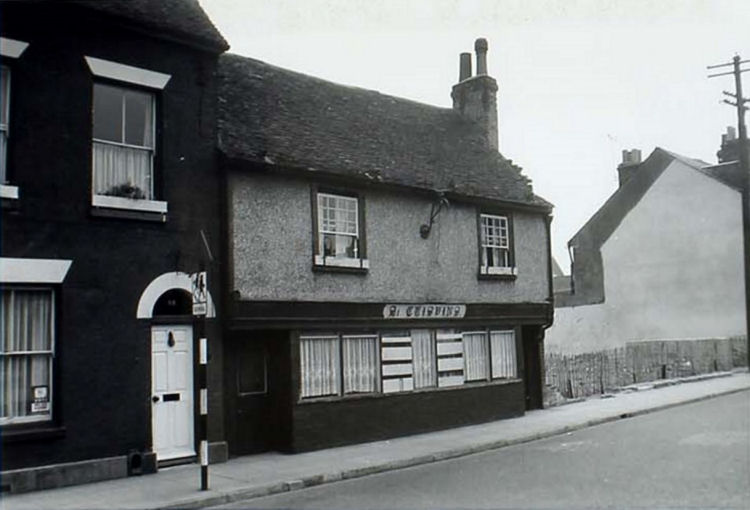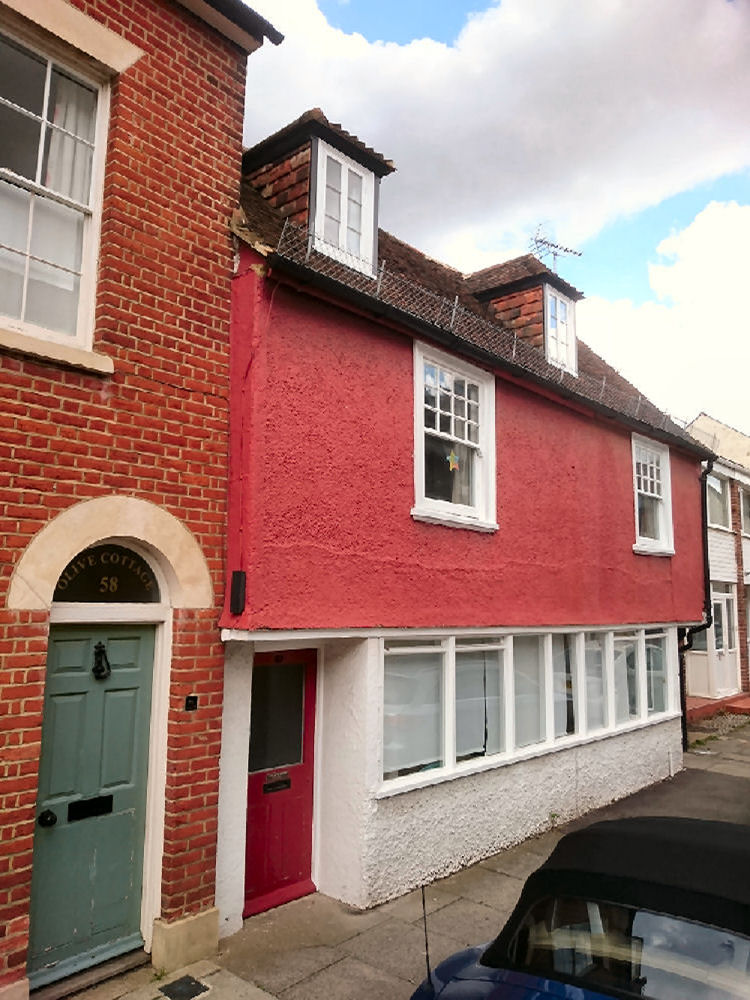|
Canterbury Journal, Kentish Times and Farmers' Gazette, Saturday 31 January 1903.
A Publican Fined.
Henry Iddenden, landlord of the "Exeter," Broad Street, was summoned for
permitting drunkenness on his licensed premises.
Mr. Rutley Mowll appeared for defendant, who pleaded not guilty.
Mrs. Matilda Crouch, wife of a plumber, living at 65, Broad Street,
stated that on Wednesday evening a man whom she did not know at the time
(but who she now identified as George Neaves, who was the defendant in a
case heard the previous day), came to her husband shop. He went out in a
peculiar way and she watched him. She assumed the worse for drink. She
followed him and saw him go into the "Exeter," and noticed that he was
served with drink by an elderly woman. Witness then made a communication
to a policeman. She followed the man thinking he had stolen something as
he went out of her house in such a mysterious way.
Cross-examined by Mr. Mowll, witness said she followed the man into the
"Exeter" because he thought he had taken something out of her shop. She
did not hear what the constable said to the man. He didn't say anything
to him about being the worst for liquor, but she heard the constable say
"You ought not to have served the man whilst in this state."
Neaves was
leaning on the counter. The man did not know if witness's place was a
public house or a shop.
In reply to Superintendent Farmery witness said she was convinced by the
way you Neaves walked that he was drunk.
P.C. Richardson stated that he was on duty in Broad Street on the
previous Wednesday night. From something told him he went into the
public house and saw Neaves their. He was leaning on the counter with
half a glass of beer in front of him. Witnessed called Mrs. Iddenden's
attention to the man. He asked Mrs. Iddenden if she knew the condition
the man was in, and she said "No, I didn't notice it when he came in."
Witness searched the man and went back to Mrs. Crouch and told her the
man had nothing on him. Accompanied by P.C. Smith witness again went to
the "Exeter." They saw Neaves still leaning on the counter drinking
beer. Witness called him outside and they found he was drunk and unable
to walk. Witness had to take him to the police station. His clothes were
covered with mud.
Cross examined by Mr. Mowll, witness said Neaves said he made a mistake
and went into Mrs. Crouch's shop in mistake for the public house. He was
standing in the "Exeter" quite quiet, but when witness began to speak to
him one could see he was the worse for drink. The man was leaning on the
counter.
Mr. Mowll (leaning on the desk) something like I am now?
Witness:- Yes, but the man was drunk. (Laughter.)
Mr. Mowll: I am glad that you draw that distinction. (Laughter.)
Witness, continuing, said the man was three parts over the counter. He
pulled him up and the man said he had made a mistake. Witness had to
lock him up.
P.C. Smith stated that he visited the "Exeter" on Wednesday night at
about 6 o'clock. He found Neaves in the bar. There was no one else in
the bar except the landlady. Neaves was leaning against the bar
apparently half asleep. There was a glass on the counter with scarcely
anything in it. The landlady said she was not aware of Neaves' state
when he came in.
Cross-examine, witness said the man was helped outside. He did not walk.
When outside they did not ask the man his name, but they asked him how
he became to be wearing workhouse clothes.
Mr. Mowll said he should call witness to show that there was a
difference of opinion as to whether Neaves was intoxicated.
Defendant stated that he had been in the house six months and was
formerly a printer. He came to the house with a testimonial. He was out
when the affair happened and he knew nothing about it.
Mrs. Iddenden, mother of the landlord, stated that Neaves had a glass of
beer and then the policeman came in. The policeman came in through Mrs.
Crouch thinking the man had taken something from her shop. The police
and searched the man and found he had no stolen property on him. The
policeman turned to the man and said "All right, dad." The old man
walked out of the bar as the constable walked in. The man offered
witness the money for a bed, as he said he wanted to sleep there. She
did not take the money but called the deputy and the man went round to
take his bed. He carried a glass of beer with him.
Cross-examined by the Superintendent witness says she noticed the man go
into the house. He walked as a sober man would. He had only been in the
house of few minutes when the constable came in. Neaves was standing in
front of the bar. She denied he was leaning over the bar.
Lydia Allen, living at 19, Artillery Gardens, stated that on Wednesday
evening she had occasion to go to the "Exeter" to fetch something. When
she went in there she saw the constable standing with an old man. The
man was standing on the kerb and was not being supported. She heard one
policeman say "You have just come out of the infirmary," and one said
"Your name is so and so and you spell it so and so." The man could walk
a straight as witness could. She could see nothing to indicate that he
was drunk. From the "Exeter" to the bottom of Broad Street and round the
corner she walked behind Neaves. There was one constable with the man
and he did not have to give him any assistance.
George Drake the "deputy" at the public house stated that he was called
into the bar by Mrs. Iddenden and asked him if he had room for the old
man as he wanted lodgings. There was nothing in his appearance to
indicate that he was the worst for liquor.
Cross-examined by Superintendent Farmery witness said the man did not
have any appearance of being drunk. He saw him in the bar about five
minutes but he didn't see the constable in the bar. The man asking him
if he had a room for him for lodgings. Witness told the man to come into
the kitchen and he came and gave him the money. He did not notice that
his clothing was all mud.
Mr. Netherclift said he should like to be informed how the man walk down
Broad Street.
P.C. Richardson was recalled and said he had to take hold of Neaves's
arm several times down Broad Street, and on nearing the police station
he had to almost carry the man.
George Allen stated that he was the father of Lydia Allen and lived at
19, Artillery Gardens. He was just going home from work on Wednesday
night when he saw two policemen outside the public house. He thought at
first there was a row and he waited two or three minutes. He saw one
policeman go one way and one go with the old man. The man was a sober as
witness was.
Mr. Mowll said his object in taking that evidence was because he wanted
to show that there was a genuine difference of opinion as to the
condition of the man. It was very difficult indeed to tell at first
whether a man was drunk or not. The landlord was out, and knew nothing
about the affair - but according to the law he remained liable to
whatever happened.
The Chairman said the Magistrates had given the matter due
consideration, and they had come to the conclusion that the case was
proved, and they had decided to fine defendant the sum of £1 and 18s.
6d. costs.
|
